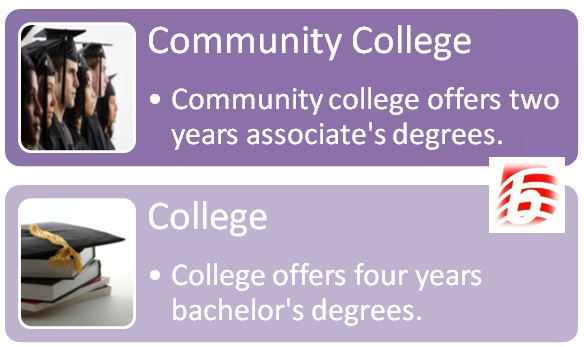Community College vs College
The main difference between a community college and a college lies in the fact that community colleges provide two-year associate’s degrees, while colleges offer four-year bachelor’s degrees. Both terms are commonly used in the United States for post-secondary educational institutions. Community colleges typically serve local residents, whereas colleges cater to a broader range of local and international students. Although there are some similarities, these institutions have unique features when it comes to admissions, tuition fees, and the variety of courses offered. Often, community college education is seen as a pathway to college education.
Key Takeaways
- Community colleges offer two-year associate’s degrees, while colleges provide four-year bachelor’s degrees.
- Admissions and tuition fees are generally more relaxed and affordable at community colleges compared to colleges.
- Community colleges focus on vocational training and career development for local residents, while colleges prioritize academic standards and cater to a broader range of students.
What is a Community College?
Community colleges have more open admission policies compared to colleges, although credit courses may require a high school diploma or equivalent. Some programs, such as Allied Health Sciences, can be highly selective even at community colleges. Tuition fees at community colleges are generally more affordable, and their student body includes both high school graduates and adult learners. These institutions offer a variety of vocational training programs, such as beauty culture, which can lead to specific job opportunities. The highest qualification offered by a community college is a two-year associate’s degree.
What is a College?
Colleges or universities in the US have more rigorous admission processes compared to community colleges. To qualify for a bachelor’s degree program, applicants typically need a good high school grade point average, standardized test scores (e.g., SAT), letters of recommendation from high school academic staff, and any other required documents. College tuition fees are often twice as expensive as those at community colleges. College students are usually high school graduates pursuing academically competitive bachelor’s degrees in fields such as medicine, engineering, or IT. Course curricula are designed by expert scholars and professors and often involve ongoing research and development. Students are assessed through strict evaluation procedures, and many programs require the submission of individual research before graduation. Colleges offer bachelor’s degrees that can lead to postgraduate degrees.
What is the difference between Community College and College?
Community colleges tend to have more lenient admissions processes and more affordable tuition fees compared to colleges. They also place a strong emphasis on vocational training and career development for adults, as opposed to the young adult students and high school graduates at colleges. As a result, local communities can benefit more from community colleges, while colleges cater to a larger local and international student population. Colleges typically focus more on maintaining high academic standards for their degree courses compared to community colleges.
In summary, community colleges serve as educational and professional training institutions for local residents, while colleges maintain strict academic standards through their comprehensively designed degree courses for a carefully selected student population.
